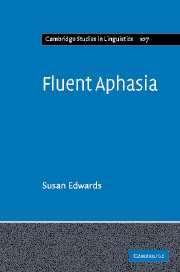Book contents
- Frontmatter
- Contents
- List of figures
- List of tables
- Acknowledgements
- Introduction
- 1 Fluent aphasia: identification and classic descriptions
- 2 Descriptions of fluent aphasia
- 3 Assessment and fluent aphasia
- 4 Connected fluent aphasic speech
- 5 Non-fluent and fluent aphasic speakers. What are the differences?
- 6 Comprehension and processing problems in fluent aphasia
- 7 The manifestation of fluent aphasia in one speaker
- 8 Some concluding thoughts
- References
- Index
Introduction
Published online by Cambridge University Press: 22 September 2009
- Frontmatter
- Contents
- List of figures
- List of tables
- Acknowledgements
- Introduction
- 1 Fluent aphasia: identification and classic descriptions
- 2 Descriptions of fluent aphasia
- 3 Assessment and fluent aphasia
- 4 Connected fluent aphasic speech
- 5 Non-fluent and fluent aphasic speakers. What are the differences?
- 6 Comprehension and processing problems in fluent aphasia
- 7 The manifestation of fluent aphasia in one speaker
- 8 Some concluding thoughts
- References
- Index
Summary
Fluent aphasia is an interesting condition for various reasons. For a number of years, the existence of two types of aphasia that not only sound different but arise from different loci of cerebral damage has been used to support the notion of two independent domains of language, the grammar and the lexicon. Damage to cerebral tissue in the pre-Rolandic areas of the cortex is associated with damage to the grammar or to the computational aspects of language, while the mental lexicon, our vocabulary store, is spared. In fact it is not clear whether aphasia causes loss or damaged access to this domain of language, as we will discuss below. In contrast to this state, damage to the post-Rolandic area results in damage to the mental lexicon or access to that lexicon: the grammar, or access to the computational aspects of language, is assumed to be spared. So, these two pathological conditions that we will refer to as non-fluent and fluent aphasia, epitomise damaged grammar versus damaged lexis. To take idealised cases, non-fluent speakers exhibit grammatical errors whereas fluent aphasic speakers struggle with lexical recall. Of course, this can be seen as a gross over-simplification and we will examine the flaws in this description as we progress through the monograph, but it not only provides a good starting point but also encapsulates issues that will be explored.
This monograph is about fluent aphasia, a type of aphasia that is commonly seen in clinics but about which little is written.
- Type
- Chapter
- Information
- Fluent Aphasia , pp. 1 - 4Publisher: Cambridge University PressPrint publication year: 2005



